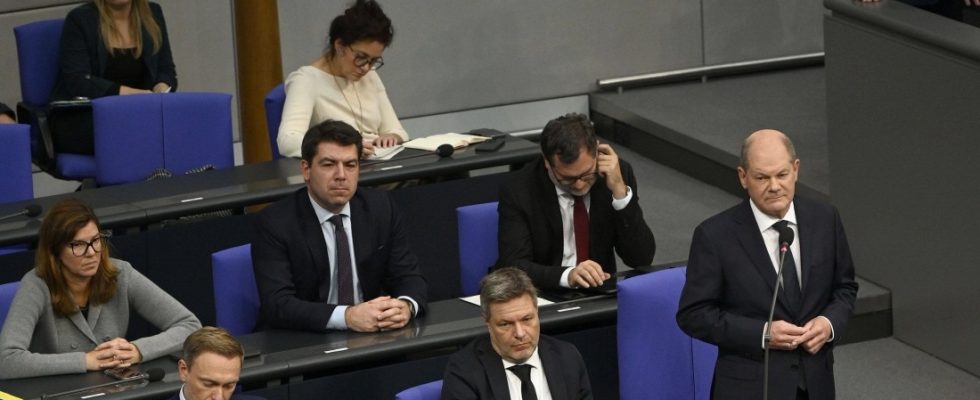On Friday, the Bundestag will deal with the traffic light government’s budget crisis. In a first reading, the supplementary budget for 2023 will be discussed. In order to pass it, the government factions must again decide on an emergency because Germany will have to take on more debt than planned. The debate is likely to get heated – and not just because of the budget for the current year. What the budget for 2024 should look like is still unclear.
Finance Minister Christian Lindner (FDP) sees the supplementary budget as a response to the Federal Constitutional Court’s ruling two weeks ago. The federal government actually complied with the debt brake in 2023, but constitutionally it would have had to take a different path, he said. “We have received legal clarity, now we are creating legal certainty.”
Lindner’s finance ministry hastily presented a supplementary budget for the current year. The concern: The use of loans over 45 billion euros could have violated the constitution. The traffic light used the money in 2023 to curb energy prices and to support flood victims, but the loans were taken out in 2022. That year the debt brake was officially suspended.
For the coming year, the finance minister indicates, the debt brake will be adhered to and no new emergency will be decided. They want to invest and implement important traffic light projects, but the government has to “deprioritize” others, he said. Lindner does not want to take on new debt simply because the interest rates are currently too high. “We would rather spend money on the future than on interest,” said Lindner.
Two weeks ago, the Federal Constitutional Court declared parts of the traffic light budgetary practice to be unconstitutional. It prohibited the reallocation of loans that were intended to combat the corona pandemic and were used for climate protection. The judges found that the traffic light violated the debt brake. 197 members of the Union parliamentary group in the Bundestag had sued.
The Union parliamentary group vice-president and budget politician Mathias Middelberg attested that Lindner at least had “hints of insight”, but otherwise criticized what he saw as incorrect booking practices with regard to the additional pots for the traffic lights. The Chancellor’s argument that the Federal Constitutional Court’s decision affects not only the current government, but also previous governments is not valid. For example, the grand coalition’s Corona aid was always aimed at a specific year, as Karlsruhe is now demanding. “They booked differently,” said Middelberg.
The traffic light had already written the constitutional breach into the coalition agreement in order to tell the “fairy tale of the iron Christian”, who believes that he can adhere to the debt brake by all means and at the same time satisfy the spending wishes of the Greens in terms of climate protection and those of the SPD in terms of social spending. “We are only coming together here because we have to repair their breach of the constitution,” said Middelberg.
What will happen next in 2024 is still completely unclear
The traffic light factions probably don’t have to fear a lawsuit for the supplementary budget for 2023 and the renewed emergency situation. CDU leader Friedrich Merz announced this. For the year 2024, which hovers over this debate, there could be another threat of legal trouble, because there are still many question marks for the coming year.
The FDP has made it clear several times that it wants to comply with the debt brake. Finance Minister Lindner announced that 17 billion euros were missing that would have to be saved in 2024. The Greens and SPD would like to abolish or at least reform the debt brake so that higher investments would be possible. Meanwhile, the leaders of the Union are trying to appear united and advocate for the debt brake. However, some CDU prime ministers have already signaled that they too can imagine reform. Berlin’s Governing Mayor Kai Wegner criticized the brakes most clearly – for which he received clear criticism from Merz in the Bundestag.
The Karlsruhe ruling has far-reaching consequences for the traffic lights and for the governments of the federal states. Money from the Climate and Transformation Fund and the Economic Stabilization Fund is no longer available. The billions are now missing from infrastructure projects and the transition to a climate-friendly economy.

